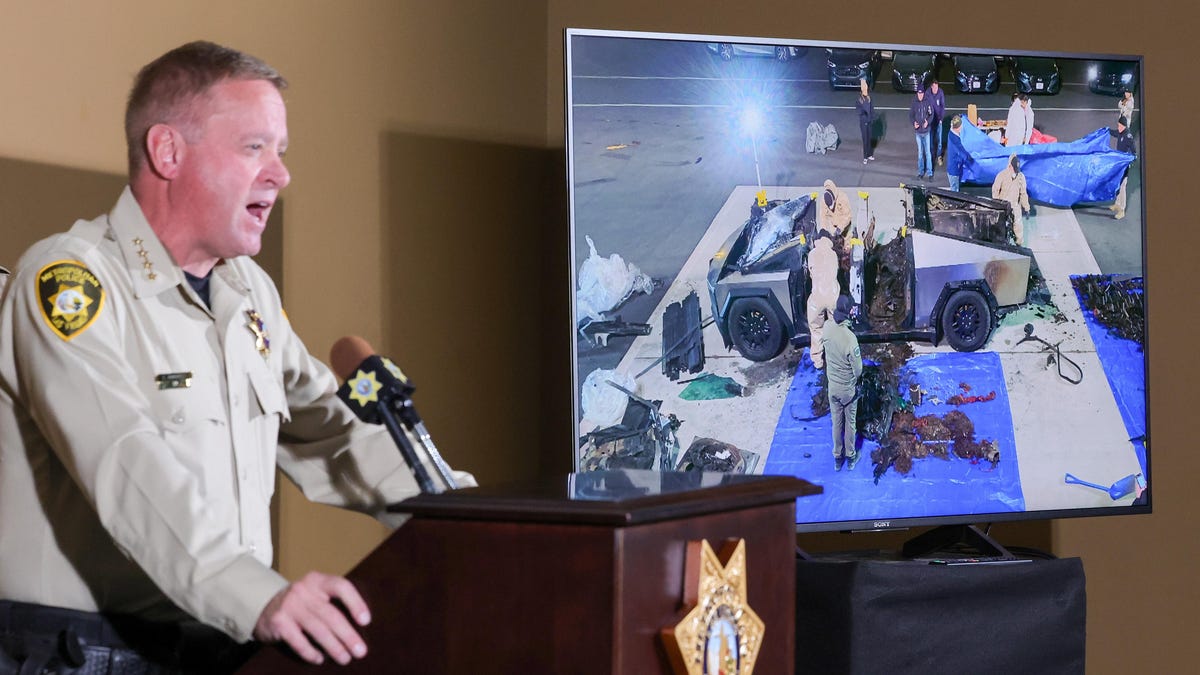After a Tesla Cybertruck full of homemade explosives detonated in Las Vegas last week, Tesla collected all of the data it had on the driver. Privacy experts, while impressed with Tesla’s deep dive, warned of what this means for the average buyer and their privacy.
Most cars these days know a hell of a lot about you, and that’s even more true for cars built by Elon Musk’s Tesla. Not only do they know where you’ve been and where you’re going, but because they’re hooked up to your phone, they can also see your contacts, call logs, texts and other little bits of information you might not want to get into the wrong hands, according to a report from the Associated Press.
Musk and Tesla quickly turned over the data they collected from that detonated Cybertruck after last Wednesday’s incident outside the Trump International Hotel. On the face of it, that’s not a bad thing. It helped law enforcement figure out who the perpetrator was, but it opened up a Pandora’s Box when it comes to the privacy of law-abiding citizens. Here’s more from The AP:
Within hours of the New Year’s Day explosion that burned the driver beyond recognition and injured seven, Tesla was able to track Matthew Livelsberger’s movements in detail from Denver to Las Vegas, and also confirm that the problem was explosives in the truck, not the truck itself. Tesla used data collected from charging stations and from onboard software — and to great acclaim.
Quickly, Tesla was able to piece together Livelsberger’s trip over the prior five days – seeing that he stopped to recharge in places like Monument, Colorado, Albuquerque, New Mexico, and Flagstaff, Arizona. Musk reportedly wrote on X, “The whole Tesla senior team is investigating this matter right now. Will post more information as soon as we learn anything.”
“I have to thank Elon Musk, specifically,” said Las Vegas Metropolitan Police Department Sheriff Kevin McMahill to reporters. “He gave us quite a bit of additional information.“
Some privacy experts were less enthusiastic.
“It reveals the kind of sweeping surveillance going on,” said David Choffnes, executive director of the Cybersecurity and Privacy Institute at Northeastern University in Boston. “When something bad happens, it’s helpful, but it’s a double edged sword. Companies that collect this data can abuse it.”
[…]
Cars equipped with cameras to enable self-driving features have added a new security risk. Tesla itself came under fire after Reuters reported how employees from 2019 through 2022 shared drivers’ sensitive videos and recordings with each other, including videos of road rage incidents and, in one case, nudity.
[…]
On its website, Tesla says it follows strict rules for keeping names and information private.
“No one but you would have knowledge of your activities, location, or a history of where you’ve been,” according to a statement. “Your information is kept private and secure.”
Of course, Tesla is not the only automaker doing stuff like this. Back in August of last year, General Motors was sued by the Texas attorney general for allegedly selling data from 1.8 million drivers to insurance companies without their consent. That is a huge no-no. One expert The AP spoke to said he doesn’t think Tesla is “especially worse” than other car companies when it comes to handling customer data. I guess that’s something.
There are zero federal laws regulating car data similar to those that hamper information collection and sharing by banks and health care providers, according to the Associated Press. Additionally, state laws are all over the place. It would be nice to see some change happen in that area, but given the way our country is going, I highly doubt it.


